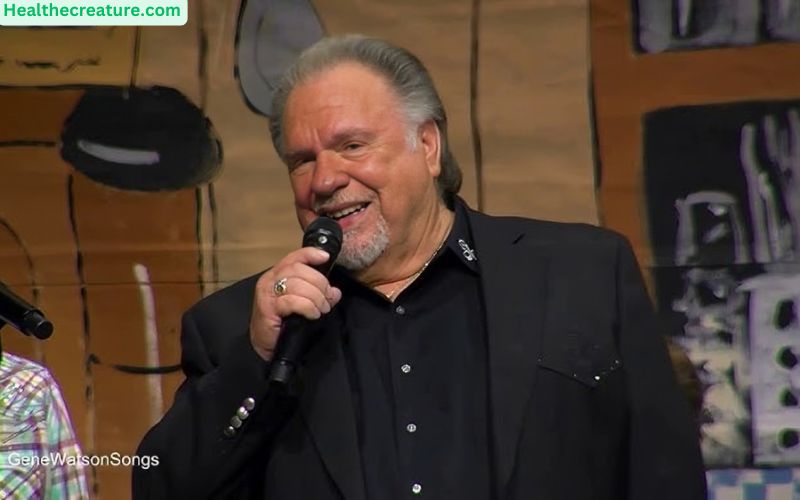Gene Watson, a legendary figure in country music known for hits like “Love in the Hot Afternoon” and “Farewell Party,” has captivated audiences for decades with his soulful voice and storytelling. However, his journey has been punctuated by a significant health battle that fans often inquire about, leading many to ask, “What disease does Gene Watson have?” In the early 2000s, Watson was diagnosed with cancer, a pivotal moment that would test his resilience and impact his life both professionally and personally. This article delves into the details of Watson’s cancer journey, the support he received, his recovery, and the ways in which he has continued to make music and inspire fans worldwide.
Early Career and Rise to Fame
Gene Watson was born in Palestine, Texas, in 1943, and grew up with a love for music that would eventually define his life. His initial career path was far from glamorous, as he worked as an auto body repairman and performed music part-time. However, his talent soon attracted the attention of record labels, and by the mid-1970s, he had signed with Capitol Records. His 1975 hit, “Love in the Hot Afternoon,” catapulted him into the limelight, marking the start of a successful career in country music. Over the years, Watson released several hit singles, including “Paper Rosie,” “Fourteen Carat Mind,” and “Nothing Sure Looked Good on You,” each showcasing his distinctive voice and emotional depth.
By the 1980s, Gene Watson had established himself as a staple of traditional country music, with his songs becoming anthems for country music lovers. His career was a testament to dedication and a love for the craft, but this success would soon face a serious challenge in the form of a life-threatening illness.
Gene Watson’s Diagnosis: Cancer Strikes

Around 2000 or 2001, Watson’s life took a dramatic turn when he was diagnosed with cancer. Although he has kept specific details about his cancer private, his diagnosis came as a shock to both him and his fans. For any artist, facing a serious illness is daunting, but for Watson, the situation was particularly challenging due to financial strain. Like many musicians, Watson had not prioritized health insurance, leaving him without coverage when he was diagnosed. As a result, his medical expenses quickly mounted, and he faced the prospect of financial instability.
Watson’s cancer diagnosis not only affected him physically and emotionally but also placed a heavy burden on his career and finances. Cancer treatment is notorious for its high costs, and Watson’s lack of insurance left him vulnerable. The financial stress compounded the physical toll of his illness, forcing him to consider how he would sustain both his career and his health.
Gene Watson’s Road to Recovery and Adaptation After Cancer
Gene Watson’s journey through cancer was a profound experience that required not only resilience but also adaptation. Watson’s road to recovery included not only surgery and chemotherapy but a shift in how he viewed his health and career. As he gradually overcame the physical toll of cancer, he implemented changes in his day-to-day life to aid his healing process and minimize the chances of recurrence. These included dietary adjustments, ensuring he received adequate rest, and monitoring his physical health more closely than ever before.
The cancer journey forced Watson to re-evaluate his approach to life on the road. Touring is famously exhausting for artists, involving late nights, constant travel, and numerous performances. While Watson has always been known for his dedication to his fans and performances, he learned to pace himself post-recovery, balancing his health with his passion for music. His perseverance and continued performances show that he adapted well to these changes, and fans today enjoy watching a seasoned performer who continues to honor his body’s needs. Watson’s journey serves as a powerful example to other performers and individuals facing health challenges, emphasizing the importance of recovery, adaptation, and taking control of one’s health.
Watson’s Positive Impact on Awareness and Community Support

Gene Watson’s experience with cancer has had a lasting impact on his fans, raising awareness about the importance of early detection, health insurance, and community support. Many fans who were unaware of the challenges musicians face regarding health coverage and finances were inspired by Watson’s story, which revealed a less glamorous but very real aspect of life in the music industry. His situation resonated particularly with fans who themselves had faced or witnessed cancer battles, deepening their connection with him as both an artist and a survivor.
Watson’s cancer journey also highlighted the role of community and support systems, a crucial element in his recovery. By sharing his story, Watson helped to remind his fans and fellow artists of the power of community and the difference it can make during difficult times. The fundraisers organized in his honor are testament to the country music industry’s close-knit support and show how his fans and colleagues rallied around him when he needed it most. Today, Watson uses his platform to remind others about the significance of preventative care and the strength found in collective support. His personal health journey and resilience offer hope to others, showing that while illness may be an unexpected chapter, it doesn’t have to define the final story.
Through his music, personal story, and career perseverance, Gene Watson has become not just a country music icon but also an inspirational figure for many facing health struggles, demonstrating that with community, determination, and faith, challenges can be overcome.
The Support of Fans and the Country Music Community
In the wake of his diagnosis, Watson found immense support from his fan base and the country music community. Fans, friends, and fellow musicians rallied around him, organizing fundraisers and benefit concerts to help cover his medical expenses. These efforts were a testament to the respect and admiration that Watson had earned over the years. The country music industry, known for its sense of community and support, came together to ensure that one of its own could focus on his recovery without the overwhelming burden of financial concerns.
The support he received allowed Watson to face his illness with a renewed sense of hope and determination. He has often expressed gratitude for the prayers, financial contributions, and emotional support that helped him through his cancer battle. For Watson, the outpouring of love from his fans and colleagues was a reminder of the impact his music had on others and a source of strength during one of the darkest times in his life.
Continuing to Perform During Treatment
Despite the physical challenges posed by his cancer diagnosis, Gene Watson continued to perform and make music throughout his treatment. For Watson, singing was not just a career—it was a source of joy and fulfillment. His decision to keep performing, even as he underwent surgery and chemotherapy, speaks volumes about his resilience and commitment to his craft.
During this time, Watson’s performances took on a new meaning. Fans, aware of his health struggles, attended his shows with a deeper appreciation for the artist and the man behind the music. Watson’s determination to continue performing, despite his illness, resonated with audiences, solidifying his status as a true country music legend.
Lifestyle Changes and Recovery
Following his treatment, Watson made significant lifestyle changes to protect his health and preserve his vocal abilities. He quit smoking in 1990 and stopped drinking around 1980, long before his cancer diagnosis. These lifestyle changes, combined with a dedication to his health, were instrumental in his recovery and allowed him to continue his career in country music.
Watson’s decision to quit smoking and drinking also contributed to the remarkable preservation of his voice. Unlike many singers whose vocal abilities decline over time, Watson’s voice remained strong, clear, and emotive. Fans have often remarked that his voice sounds as good, if not better, than it did during his peak years. Watson attributes this vocal longevity to his commitment to self-care and the positive lifestyle changes he embraced.
Gene Watson’s Resilience and Return to the Stage
After his recovery, Watson returned to the stage with a renewed sense of purpose. His experience with cancer had changed him, deepening his appreciation for life, music, and the people who supported him. In the years following his treatment, Watson continued to tour and record, proving that his passion for music remained as strong as ever. For Watson, performing was not just a career; it was a calling, and he was determined to continue sharing his voice with the world.
In 2020, Watson achieved a lifelong dream by becoming a member of the Grand Ole Opry, a crowning achievement in a career that had already spanned decades. His induction into the Opry was a celebration of his contributions to country music and a recognition of his resilience. For Watson, this honor was particularly meaningful, as it symbolized his triumph over the challenges he had faced and his enduring legacy in country music.
Lessons from Gene Watson’s Story
Gene Watson’s journey through illness and recovery offers several important lessons. His experience highlights the financial vulnerabilities that many artists face, particularly in the area of healthcare. Watson’s lack of health insurance left him in a precarious position, underscoring the importance of planning for unforeseen circumstances. His story serves as a reminder to aspiring artists about the need for financial and health security in an unpredictable industry.
Additionally, Watson’s resilience in the face of illness is a testament to the power of determination and community support. His ability to continue performing and creating music despite his health challenges is an inspiration to fans and fellow artists alike. Watson’s journey shows that, even in the face of adversity, it is possible to overcome challenges and continue pursuing one’s passions.
Gene Watson Today: A Lasting Legacy
Today, Gene Watson continues to tour and perform, sharing his music with audiences across the United States. His voice, undiminished by age or illness, remains a powerful instrument that has touched the hearts of millions. Fans who attend his concerts not only enjoy his classic hits but also witness the legacy of a man who faced life’s challenges with grace and determination.
Watson’s story resonates deeply with his fans, many of whom have faced their own health challenges. For those who have battled illness or supported loved ones through difficult times, Watson’s journey serves as a beacon of hope. His music, filled with themes of love, loss, and resilience, reflects his own experiences and offers comfort to listeners navigating their own struggles.
See Also: What Disease Does David Gilmour Have?
FAQs
What disease does Gene Watson have?
Gene Watson was diagnosed with cancer in the early 2000s. Although he has kept specifics about the type of cancer private, he has shared that his diagnosis and subsequent treatment were financially and physically challenging. His battle with cancer required surgery and chemotherapy, but he ultimately made a full recovery and returned to the music scene.
How did Gene Watson’s cancer diagnosis impact his career?
Watson’s cancer diagnosis placed a financial strain on him due to a lack of health insurance at the time. Despite this, he continued to perform throughout his treatment, demonstrating his commitment to his fans and his craft. His health journey inspired fans and brought the country music community together, resulting in fundraisers to help cover his medical costs.
Did Gene Watson make lifestyle changes after his diagnosis?
Yes, after his cancer recovery, Watson became even more conscious of his health. He had already quit smoking in 1990 and stopped drinking around 1980, which he credits for helping maintain his vocal quality. Following his treatment, he adopted a more health-conscious lifestyle to support his ongoing recovery and maintain his voice.
Is Gene Watson still performing despite his past health issues?
Yes, Gene Watson continues to tour and perform. His dedication to his music remains strong, and he performs at venues across the United States. His voice, still rich and powerful, has maintained the high quality that his fans have come to love, even after his battle with cancer.
How did the country music community support Gene Watson during his illness?
The country music community and his fans rallied to support him through benefit concerts and fundraisers, helping alleviate his financial burdens during treatment. The outpouring of support from fans and fellow musicians was instrumental in his journey, as he has often mentioned how much their prayers and financial help meant to him.
Conclusion
The question, “What disease does Gene Watson have?” has a profound answer rooted in resilience, community, and the unbreakable spirit of an artist. Watson’s battle with cancer in the early 2000s tested his resolve and highlighted the vulnerabilities that many artists face. Yet, through the support of his fans, the country music community, and his own determination, Watson overcame his health challenges and continued to make music that resonates with audiences around the world.
Gene Watson’s legacy extends far beyond his music. His story of perseverance in the face of illness, his commitment to his craft, and his gratitude for the support he received have left a lasting impact on fans and fellow artists alike. Today, Watson stands as a symbol of strength, a reminder that even life’s greatest challenges can be met with courage, support, and an unwavering passion for what we love.


